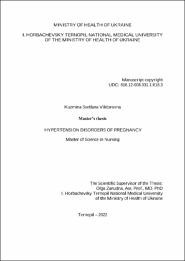| dc.description.abstract | Hypertension is the most common medical disorder of pregnancy and is reported to complicate up to 1 in 10 pregnancies and affects an estimated 240,000 women in the United States every year. Although physicians for millennia have recognized preeclampsia, relatively little is known about its pathogenesis and prevention. The primary concern about elevated blood pressure relates to the potential harmful effects on both mother and fetus. These potential adverse effects range in severity from trivial to life threatening. Hypertensive disorders of pregnancy are a leading cause of maternal morbidity and mortality. The data for this project was collected through general health assessment, collection of laboratory tests results, clinical and statistical data, assessment of risks factors and complications hypertension in pregnancy. It has been shown that the presence hypertension disorder in pregnant women aggravates the clinical picture of the disease and may cause hemodynamic disturbances in women. It has been established that the use of metabolic (magnesium sulfate ), hemodynamic (antihypertensive drugs) agents under dynamic observation, the implementation of non-drug measures (physiotherapy exercises, psychoprophylactic preparation for childbirth, therapeutic and protective regimen) decrease severity symptoms and the expected better outcome of pregnancy for women and fetus. In the course of the study, we determined nursing's role in educating pregnant women, monitoring and preventing hypertension disorders in pregnancy. These findings indicate effectiveness of implementation of nursing care for pregnant women with hypertensive disorder. Hypertensive disorders are complicated and require close monitoring by the patient and the healthcare team. Nurses must ensure that the patient receives all the education that she needs and understands the importance of caring for herself. The patient must also be taught when to call for help. Education must be specific for the woman’s condition and must be thorough. It must also cover preeclampsia for all women, because of the risk of postpartum preeclampsia. Women in low socioeconomic conditions or with low literacy levels need education that is tailored for them and that they can understand. Collaboration is necessary for these women once they are in the hospital | uk |

